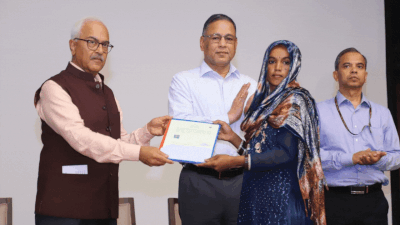Indian citizenship: first certificates granted amid opposition protests
The Home secretary handed out certificates to 14 people yesterday. Promulgated in 2019 and implemented in March this year, the CAA provides easier access to Indian citizenship for members of religious minorities from Muslim majority countries. Analysts argue that religion is being used by the BJP to rouse its electorate in the ongoing elections.
New Delhi (AsiaNews) – For the first time, India has granted citizenship to people under the controversial Citizenship Amendment Act (CAA), a piece of legislation much discussed and challenged because it discriminates against Muslim refugees.
Although numbering 200 million, Muslims are a minority in India, and have been repeatedly targeted by the current ultranationalist Hindu government.
Home Secretary Ajay Kumar Bhalla yesterday handed out the first citizenship certificates to 14 recipients in the capital New Delhi after they applied online at a special portal, a Home Affairs ministry spokesman said.
Home Affairs Minister Amit Shah told the ANI news agency that some 300 people were granted Indian citizenship under the CAA across the country.
The law, approved by the Indian Parliament in 2019, only came into force in March this year because its promulgation sparked violent clashes and protests that left 53 people dead, most of them Muslims.
The CAA grants retroactively Indian citizenship to people from Muslim-majority Afghanistan, Pakistan and Bangladesh who belong to religious minorities (Hindus, Parsis, Sikhs, Buddhists, Jains, and Christians).
Specifically, migrants who arrived in India before 31 December 2014 due to "religious persecution or fear of religious persecution" in their country of origin can take the fast track to naturalisation, since residency requirements were reduced from 11 to five years.
Human rights groups have pointed out that migrants who belong to a religious majority can also be persecuted, like Afghans fleeing the Taliban.
India has never ratified the Refugee Convention.
After the CAA came into effect, Human Rights Watch said that New Delhi should establish non-discriminatory asylum procedures with a path to citizenship regardless of religion.
The opposition accuses the government of stoking religious fears, while Prime Minister Narendra Modi’s ruling Bharatiya Janata Party (BJP) says that the main opposition party, the Indian National Congress (INC), is pro-Muslim.
Recently, Prime Minister Modi said that if the opposition came to power, it would take Hindu wealth and give it to those who “have more children”, i.e. Muslims, whom he also described as “infiltrators”.
Other BJP leaders have accused the INC of seeking to implement Islamic law or eliminating quotas in education and public administration for those from disadvantaged backgrounds.
Modi is running for a third term. Elections are currently underway across the country, in seven phases until 1 June, with results announced three days later.
According to analysts, by focusing on sectarian divisions, the BJP is trying to rally its Hindu base, after voter turnout in the first phase was not very high.
25/10/2022 14:21
23/02/2024 19:29
11/03/2022 17:45
22/03/2024 19:16
23/05/2019 18:54







.png)










